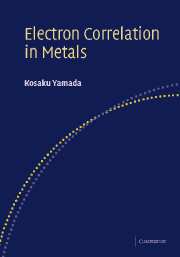Book contents
- Frontmatter
- Contents
- Preface
- 1 Fermi gas
- 2 Fermi liquid theory
- 3 Anderson's orthogonality theorem
- 4 s–d Hamiltonian and Kondo effect
- 5 Anderson Hamiltonian
- 6 Hubbard Hamiltonian
- 7 Fermi liquid theory of strongly correlated electron systems
- 8 Transport theory based on Fermi liquid theory
- 9 Superconductivity in strongly correlated electron systems
- Appendix A Feynman relation
- Appendix B Second quantization
- Appendix C Interaction representation and thermal Green's function
- Appendix D Linear response theory
- Appendix E Transport equation derived by Éliashberg
- Index
Preface
Published online by Cambridge University Press: 23 December 2009
- Frontmatter
- Contents
- Preface
- 1 Fermi gas
- 2 Fermi liquid theory
- 3 Anderson's orthogonality theorem
- 4 s–d Hamiltonian and Kondo effect
- 5 Anderson Hamiltonian
- 6 Hubbard Hamiltonian
- 7 Fermi liquid theory of strongly correlated electron systems
- 8 Transport theory based on Fermi liquid theory
- 9 Superconductivity in strongly correlated electron systems
- Appendix A Feynman relation
- Appendix B Second quantization
- Appendix C Interaction representation and thermal Green's function
- Appendix D Linear response theory
- Appendix E Transport equation derived by Éliashberg
- Index
Summary
P. W. Anderson has achieved many brilliant theories in the wide field of condensed matter physics. His book titled Basic Notions of the Condensed Matter Physics was published in 1984. In this book Anderson stresses two basic principles of condensed matter physics. One of the principles is ‘broken symmetry’. This means that condensed matter systems undergo phase transition to take a state possessing lower symmetry than that of the Hamiltonian. This statement corresponds to the appearance of a ferromagnetic state and a superconducting state, etc. at low temperatures. This principle manifests discontinuous change.
Another basic principle is the principle of ‘adiabatic continuity’. This principle tells us that when we study a generally complicated physical system we can refer to a simple system that contains the essential nature of the real system and understand the complicated system on the basis of knowledge of the simple system. Anderson stresses that the most beautiful and appropriate example showing the importance of the continuity principle is Landau's Fermi liquid theory. Following the continuity principle, we start from a non-interacting Fermi gas and introduce interactions among particles gradually. There exists a one-to-one correspondence between the free particle system before the introduction of the interactions and the Fermi liquid after the introduction. It is the basic character of the Fermi liquid at low temperatures that we can introduce interactions as slowly as possible owing to the long lifetime of quasi-particles.
- Type
- Chapter
- Information
- Electron Correlation in Metals , pp. vii - xPublisher: Cambridge University PressPrint publication year: 2004

